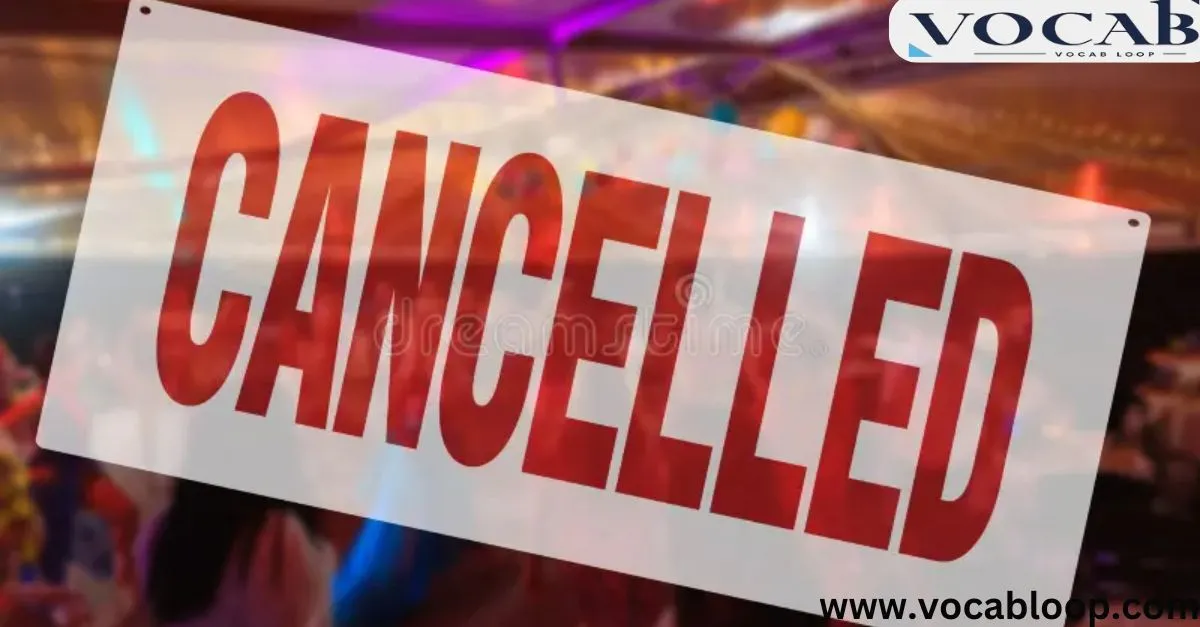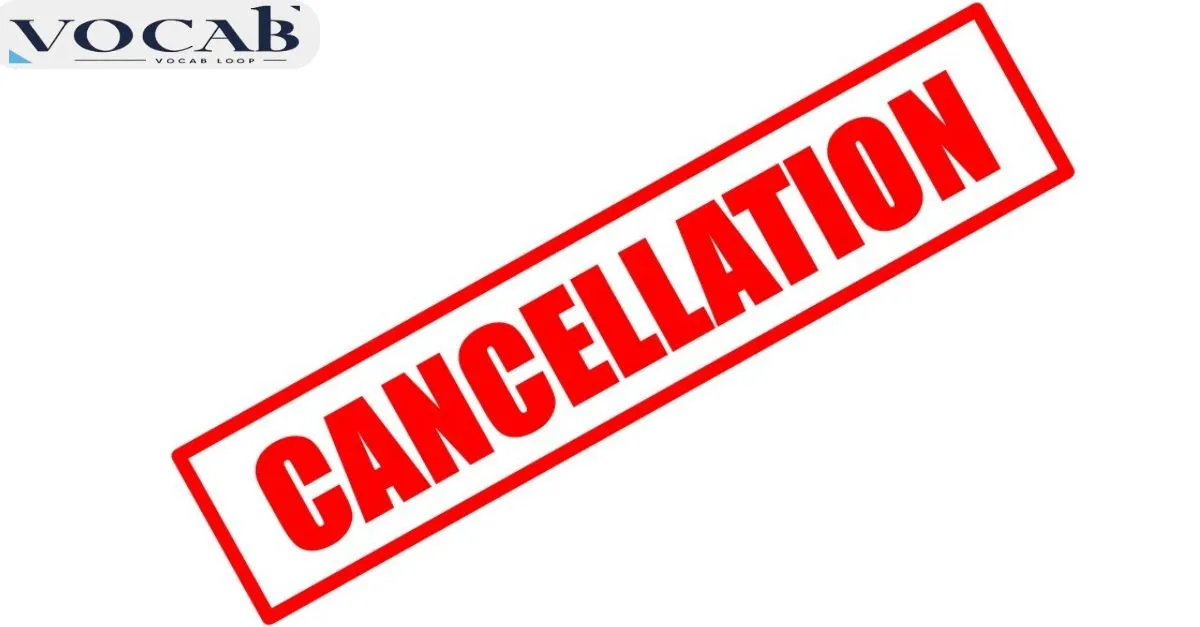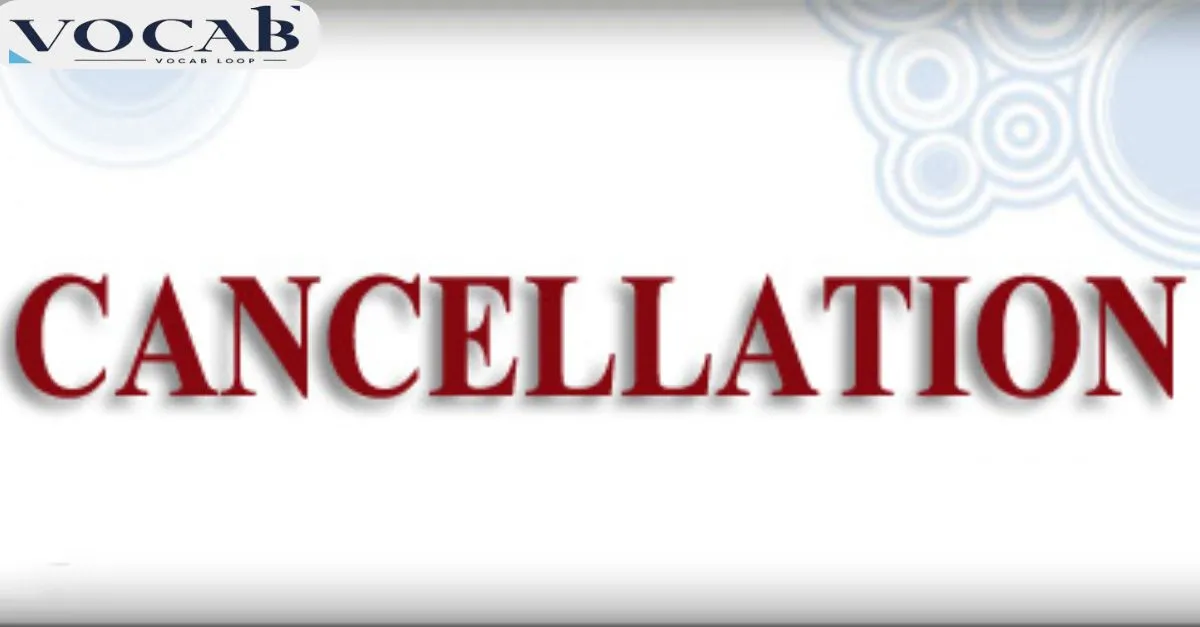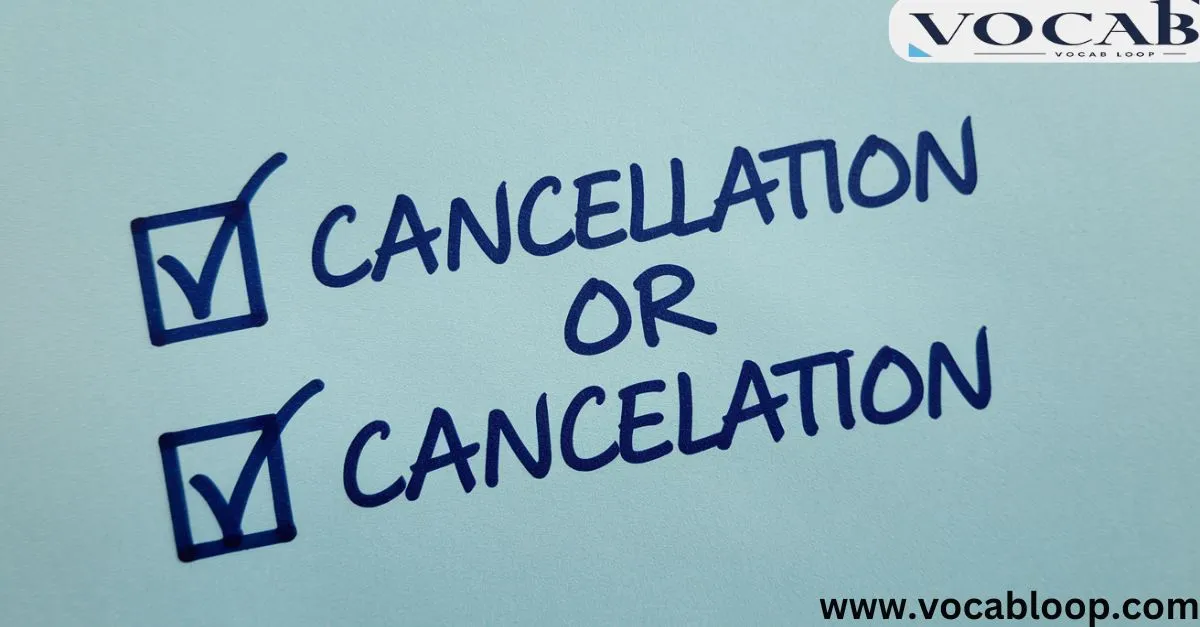Choosing between canceled vs canceled and cancellation or cancelation depends on whether you’re using American or British English. In American English, “canceled” and “cancellation” are preferred, while British English typically doubles the “L” in both words, as in canceled and cancellation.
Following Webster’s Dictionary, using “canceled” and “cancellation” in American writing helps keep your language clear and consistent, especially in formal documents.
Understanding Cancellation or Cancelation
Is the Cancellation Word Correct?

In the U.S., “cancellation” with two “L’s” is the preferred spelling, meaning the act of ending or nullifying something. It’s used in contexts like flight cancellations and event cancellations and is the expected form in business and legal writing.
This spelling aligns with U.S. English conventions and is widely recognized in official documents.
Definition of Cancellation
Cancellation (with two “L’s”) is the most commonly used spelling. It refers to the act of ending or nullifying something, such as a booking, event, or subscription.
Meaning of Cancellation
The meaning of cancellation includes any action that terminates, rescinds, or nullifies a decision, event, or agreement.
Is the Cancelation Word Correct?

Cancelation with one “L” is recognized in American English, but it’s less common and often seen as outdated.
It has the same meaning as cancellation, referring to the act of ending something, but cancellation (with two “L’s”) is preferred and more widely accepted, especially in American writing.
Definition of Cancelation
Cancelation (with one “L”) is an alternative spelling, primarily used in American English, but less commonly seen in formal or official contexts.
Meaning of Cancelation
Cancelation also refers to the act of ending or nullifying something, but this form is less frequently used compared to cancellation.
Quick Summary
When you’re deciding between cancellation vs cancelation, remember that “cancellation” is the preferred and more popular choice in American spelling. Using the double “L” aligns with current standards, making your writing look more polished and consistent with U.S. English conventions.
ratios in Different country
| Country | “Cancelation” (%) | “Cancellation” (%) |
| United States | 9 | 91 |
| United Kingdom | 4 | 96 |
| India | 3 | 97 |
| Philippines | 7 | 93 |
| Canada | 7 | 93 |
| Australia | 4 | 96 |
| Liberia | 0 | 100 |
| Ireland | 5 | 95 |
| New Zealand | 7 | 93 |
| Jamaica | 7 | 93 |
| Trinidad & Tobago | 0 | 100 |
| Guyana | 0 | 100 |
“Cancellation vs Cancelation”: Which Spelling Should You Use?

Cancellation or Cancelation Parts of Speech
Both “cancellation” and “cancelation” serve as noun forms of the verb “cancel.” They describe the process or action of stopping or ending something, such as appointments, subscriptions, or events. While both forms are technically correct, U.S. English generally favors “cancellation.”
Pronunciation of Cancellation or Cancelation
There’s no change in pronunciation between “cancellation” and “cancelation.” Both are pronounced as “kan-suh-lay-shuhn.” The spelling choice doesn’t affect how the word sounds; it’s simply a matter of regional spelling differences.
Why Do American and British English Differ in the Use of Single or Double “L”?
This difference in spelling between American and British English dates back to Noah Webster, who sought to simplify English for American readers. Webster’s influence led to the removal of some double letters, which explains why American spelling often uses fewer consonants, as in “traveler” vs. “traveler.”
Exceptions to the Rule
Words like “cancellation” kept the double “L” in American English, likely because it reflects writing patterns in older English variants, where certain word forms kept additional letters for clarity or emphasis.
Exploring the Word ‘Cancellation’
Origin and Usage in American and British English Spellings
The word cancellation comes from the Latin “cancellare,” meaning to cross out with lines. Both American and British spelling started with “cancellation” using two “L’s,” but the American dictionary shifted over time. Despite Webster’s preference for simplified spelling, “cancellation” kept its original form in most American texts.
Side-by-Side Comparison: Cancellation or Cancelation
| Spelling | Usage | Region |
| Cancellation | Commonly used | American, British |
| Cancelation | Rarely used | American only |
Which One is More Acceptable: Cancellation or Cancelation?

In American English, cancellation is far more acceptable. Most people, businesses, and even software spell-check tools recognize this as the correct spelling. Choosing “cancellation” in official or formal writing will make your work appear consistent and professional.
Trick to Remember the Difference Between Cancellation or Cancelation
To remember which spelling is preferred, think of the common phrase “flight cancellations” as a reminder. Flight cancellations are common, and they’re almost always spelled with two “L’s” in American sources.
Origins of Cancellation or Cancelation
Cancellation
“Cancellation” with two “L’s” has origins in British grammar and maintained its popularity in American usage despite language simplification.
Cancelation
“Cancelation” has appeared in American texts historically but didn’t gain the same widespread use. Today, it’s mostly seen in informal or older documents.
Synonyms of Cancellation or Cancelation
Cancellation
- Annulment
- Revocation
- Abolishment
- Termination
- Withdrawal
- Voidance
- Invalidation
- Reversal
- Dissolution
- Nullification
Cancelation
- Discontinuation
- Ceasing
- Halting
- Abatement
- Cessation
- Rescission
- Closure
- Dismissal
- Curbing
- Stopping
Everyday Usage Examples

Cancellation
- The airline issued a cancellation for tomorrow’s flights.
- There was a sudden cancellation of the concert.
- She received a cancellation email for her appointment.
- His plans were disrupted by a last-minute cancellation.
- The cancellation of services shocked the community.
- The program’s cancellation affected many students.
- We’re disappointed by the cancellation of the event.
- Due to weather, many flights faced cancellations.
- Her ticket cancellation was confirmed by email.
- The trip’s cancellation was due to safety concerns.
Cancelation
- He asked if cancelation fees would apply.
- Many events faced cancelation due to the storm.
- Her request for a cancelation was approved.
- The hotel offered a free cancelation policy.
- A sudden cancelation affected her travel plans.
- They checked for any cancelation policies.
- His class cancelation notice arrived late.
- They received a cancelation email.
- The cancelation of her order was processed.
- A quick cancelation was necessary.
FAQs
Why is “cancellation” the preferred spelling in American English?
Though both are correct, “cancellation” is more widely used in American texts due to its familiarity.
Are “cancellation” and “cancelation” interchangeable?
Yes, but “cancellation” is more common in American usage.
Is one form more correct than the other?
While both forms are correct, “cancellation” is generally preferred.
How often is “cancelation” used in professional U.S. writing?
“Cancelation” is rare in modern formal writing.
Do other words in English have similar double consonant differences?
Yes, words like “traveler” and “counselor” follow similar patterns, using one “L” in the U.S.
Conclusion
When it comes to cancellation vs cancelation, the American English preference is clear: “cancellation” with two “L’s” is the best choice for consistent, professional writing. By choosing “cancellation,” you avoid common spelling confusion and align with U.S. English rules.
Next time you’re faced with this spelling choice, you can confidently use “cancellation” for clarity and correctness in all your writing.

Alex Hormozi is a seasoned blogger at Vocab Loop, known for his deep insights into language, vocabulary, and grammar. With years of experience in writing, Alex shares practical tips and effective strategies to help readers improve their linguistic skills and enhance their writing abilities.

